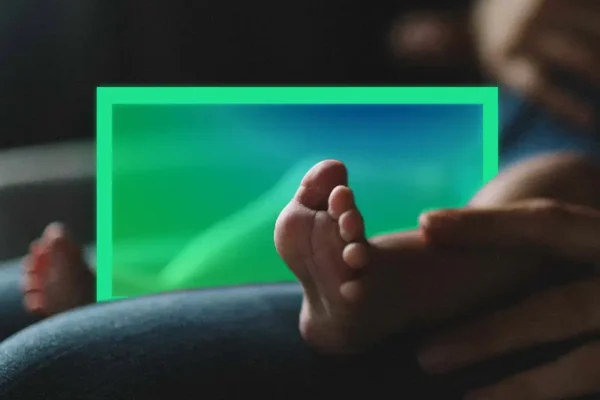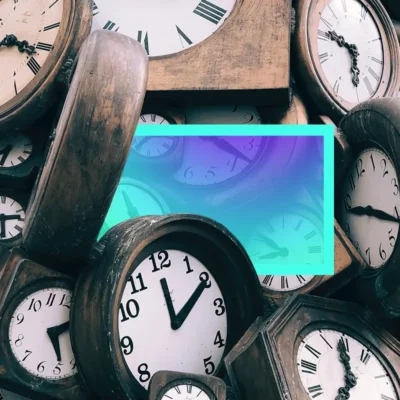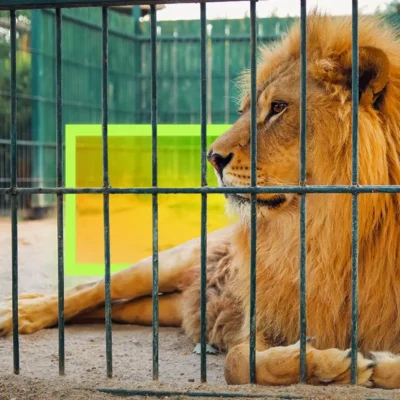Let them see you cry
Reshma Saujani, activist and founder of Girls Who Code and Moms First, prides herself on being in control. She’s always been the one to say “I got this.” But after years of struggling to achieve her lifelong goal of being a mother, the weight of powering through the pain gets to be too much. In this week’s story, Reshma learns that instead of white knuckling through life’s unexpected changes, she can allow herself the time and space to properly feel them.


Table of Contents:
Transcript:
Let them see you cry
ROHAN GUNATILLAKE: Life is unpredictable. We may start the day or week or year with a certain plan in mind, only for things to completely fall apart in ways we never expected. This week, Reshma Saujani, founder and CEO of the prestigious non-profits Girls Who Code and Moms First, shares the unflinchingly candid story of her struggles with fertility. And how she learned to stop, white knuckling her way through life’s changes, allowing herself the time to grieve, to laugh, and to feel.
The body relaxed. The body breathing. Your senses open, your mind open, meeting the world.
RESHMA SAUJANI: The waiting room at my doctor’s office in downtown Manhattan is bright and white. Magazines sit piled on a corner table. Quiet conversation drifts over from the receptionist’s desk. My fiance Nihal and I sit in a row of chairs against the wall. My body’s here, but my mind is elsewhere in my phone. Knocking out work emails. As usual.
I’m 36 years old, and I’ve built my life around being a hard worker. Well, not just a hard worker. The hardest worker. Whether I’m pursuing an Ivy League education or starting my own national non-profit — I want people to see how capable I am. To see how much I can take on. To know, I’ve always got this.
When I put the phone down and look up, Nihal smiles. I smile back. We both burst out laughing. I snap back to the present moment. To the reason we’re at my OBGYN today. And I feel a rush of excitement.
Work can wait for once. I’m going to be a mom.
Nihal and I weren’t planning on getting pregnant. But I’ve always wanted to be a mother. I was one of those girls with a million stuffed animals. I baby our bulldog Stanley, as if she were our child. So, the day I find out I’m pregnant is a day of pure joy.
I’m at work at the New York Public Advocate’s office. It’s a beautiful day and I feel sick. That’s weird. I never get sick. That’s when I realize my period’s late. In my mind I’m thinking, “There’s no way I’m pregnant.” But I pick up a pregnancy test from the Walgreens across the street. It’s positive. This is crazy.
They say you should wait at least 12 weeks before telling people about a new pregnancy. But Nihal and I call everyone. Immediately. We’re just too excited. We realize I’ll be eight months pregnant at our upcoming destination wedding, so that gets canceled. Our more traditional Indian parents aren’t happy about it. My sister’s pregnant too. I’m so thrilled that we’re going to have babies at the same time. The sun shines brightly over New York City, as if celebrating with me. Everything feels light. Joyous.
Back at the doctor’s office, Nihal and I settle into the exam room. The doctor prepares the ultrasound. I’m pretty far along in my first trimester. This check-up feels routine. My mind is already in the future. Making plans for after the baby’s here.
The doctor starts the exam. I see her face grow serious. There’s no beeping coming from the machine. The room feels cold. Silent. After a moment, she turns to us and says very plainly, “There’s no heartbeat. I’m sorry.”
I’m confused. Shocked. Devastated. No heartbeat? What does she mean? I’ve seen TV shows and movies that depict pregnancy loss but it never looks like this. The women are always in the bathroom and are bleeding suddenly. They’re not in a doctor’s office, feeling fine.
My eyes fill with tears. The doctor explains where to get a D&C, the procedure to remove excess tissue from inside my uterus. No one talks about this. No one ever explains that this is a possible — and even for some people, a likely — outcome. Everybody’s body works, right? We’re supposed to have babies, right? Pregnancy has always been presented to me in the most glowing light. So, I try to live up to that example. I swallow my grief and power through the pain.
I’m at ABC Kitchen in Manhattan. A chic restaurant built into the side of a chic furniture store. The sound of clinking glasses and loud conversation fills the room. It’s dimly lit, but I can still make out the faces of the high profile attendees seated at the tables. Author and wellness figure Deepak Chopra, chef and restaurateur Jean-Georges. The host committee for tonight’s fundraiser is a real who’s who. I should know, I put this all together. I brought everyone here to raise an unprecedented amount of political donations. It took months of planning and hard work.
In a few minutes, I’ll be introducing the star of the evening, the man we’re all here to raise money for President Barack Obama.
It’s 2012. I stand off to the side of the stage in my new blue dress. My dark brown wavy hair falls around my shoulders. My black heels reflect the nearby stage lights. The giant wooden beams of the rustic ceiling hang just low enough to make me feel claustrophobic. Everyone is dressed in their business casual finest. People walk up to me with smiles on their faces. A staffer asks me a question. A waiter rushes by with a tray of drinks. But I barely see or hear any of it. It’s all a big blur.
This should be a huge night for me. Not just because I’m introducing the President. But because of what it took to get here. To be in this room with these people. A few years ago, I launched an unsuccessful congressional campaign to unseat an 18 year incumbent. I was a huge underdog, and I put it all on the line. Completely upended my life to chase after a dream. When I lost, I thought my career was over. I felt I was this failed loser. My family’s from South Asia. I’m first generation. Desi. I always felt like an outsider. And the political establishment definitely wanted to make that the case.
But I powered through. I kept working. Never let them see me sweat. Now, I’m helping to raise millions of dollars, and being asked to introduce the most powerful man in the world.
This is the ultimate form of perseverance. I should feel great. I should be on top of the world. Instead, I feel almost nothing.
A sea of people brush by me. Their voices muffled. It’s been three days. Just three days since my miscarriage. Since my fiance and I were told, “There’s no heartbeat.” I haven’t even gotten the D&C procedure yet. No one in this room knows what’s happened because I haven’t told anyone. Not friends. Not family. No one. I hold it all inside. Keep it private.
There’s a real culture of silence around miscarriage and pregnancy loss. No bereavement benefits at work. No support groups I’m aware of. The people around me don’t talk about it. So, I don’t talk about it either.
Of course, I feel sad. But I’m generally not a big crier. I don’t really emote. When I get sad, I get very stoic. It’s the behavior I saw modeled for me at a young age. When people in my family experience loss or feel grief, that grief usually comes out as anger, frustration or silence.
Everything — from my upbringing to the culture — sends me the same message: Buck up. Be tough. Keep moving. And as a woman, I hear that message even louder.
My name is announced over the PA system. I step out of the darkness. The glare from the stage lights hits me. Behind me is a row of American flags. The crowd cheers. I smile. I act normal.
This is perseverance, too. My body perseveres through the pain and the loss of my miscarriage. From that acute sense of failure I feel. But really, I’m just pushing through the pain. I can’t feel the magnitude of what this moment means for my career or what losing the pregnancy means for me personally. I close myself off from both. Like so many women I know, I feel I have to be perfect, always. I have to keep moving. I have to be strong.
GUNATILLAKE: This is a difficult moment. Let whatever is here for you, be here. Acknowledging the thoughts and feelings that are present. That too is a kind of strength.
SAUJANI: Four hundred girls cram into the school auditorium. They’re all between 12 and 18 years old. Their voices echo off the polished floor and up to the high ceilings. Their excitement vibrates in the air. They’re all so happy. Happy to be at this event. Happy that I’m here.
It’s 2018. I’m in Utah, where I’ve been invited to speak to a group of girls on behalf of my nonprofit, Girls Who Code. Our organization aims to close the gender gap in computer science and other technological fields by giving access and opportunities to hard working, diverse girls all across the country. As the founder and CEO, I’m often asked to speak at events like this, so this isn’t a new experience for me. I know what’s expected of me. My 30 minute speech is prepared.
But something about today feels different. I feel shaky. I feel sick. I want to cry.
This morning, I wake up at 4 a.m. on the West Coast to a phone call from my doctor back in New York. I’m given bad news: My hCG levels aren’t rising. The fetus I’m carrying won’t go to term. It’ll be yet another missed pregnancy. My fifth.
This news doesn’t shock me anymore. I almost expect it. After our first pregnancy loss, Nihal and I try again and again for years. I have several more miscarriages, but I’m on a mission to be a mother. Our failure to conceive becomes so routine that we create a little ritual every time we get the news from my OBGYN. We go to Potbelly, a chain sandwich shop in our neighborhood. I have the mushroom and cheese sandwich and a sugar cookie. Then I go home, hold our dog Stanley, and cry.
Finally, in 2015, Nihal and I are lucky enough to have our son Shaan. Now, we’re trying for a second child and experiencing the same difficulties. We’re no longer those naive, first-timers in my doctor’s office. When I lose a pregnancy, we know what questions to ask. I now know I have autoimmune issues. I take Lovenox shots and Heparin shots. I’ve gone through several failed cycles of IVF treatment. I think I’ve figured out my protocol.
The call this morning confirms that I’m in the same pattern I’ve been in for years. And that pattern extends to my response to the news as well.
I get off the phone with my doctor and head straight to the airport. I fly to Utah. I take a car to the event and walk on stage with a big smile on my face, to the cheers and applause of hundreds of excited and eager girls. I take all the sadness and grief and I swallow it. I don’t cry. I don’t say anything. I don’t feel anything.
Standing in front of all these girls. Seeing their proud faces. I keep thinking about how I’ve always wanted a daughter. And the sadness of everything finally starts to catch up with me.
There’s nothing special about this event. It’s not even the first time I’ve had a public appearance directly after learning about a miscarriage. There’s no reason that this is my breaking point. But it is. I’m losing that stoicism I’ve always had. I’m starting to be less in control.
I feel like there’s something wrong with me. Not because I can’t get pregnant. But because I can somehow get this news, get on a flight, and stand up in front of hundreds of people as if nothing is wrong. This can’t keep happening. I don’t want to be this person anymore. I don’t want to cut myself off from my heart like that.
When I return to New York, I have an all-hands meeting with my team. We’re in a shared workspace with several large tables and big windows along one wall. Before I even stand up to speak, I feel myself getting emotional. I’ve never been like this in front of my team before. I always want to be a strong leader in their eyes. Yes they know the logistics of my IVF cycles and my struggles to get pregnant, but they don’t know the emotions I’ve been holding inside. They don’t know the pain I’ve been hiding. Now, I let it all out. I tell them everything. And then I cry.
“I need a break,” I say. “I need to take a break.”
Without hesitation, everyone in the room looks at me and says, “We got you.”
I’ve built such an identity around the fact that I got it. I always got it. It’s part of what it means to be me. No one works harder than me. No one bears pain as much as I do. I don’t need anything. It’s a badge of honor that I’ve carried my whole life because of how I was raised and how the world told me I needed to behave in order to be successful. Of course, I’ve heard all the talks and seen all the seminars on the power of vulnerability. I’m even self aware enough to tell the young women that work for me, “Don’t do this like I am.” But actually being vulnerable in this way? Asking for help and crying? It’s very off brand. And it’s exactly what I need right now.
I can’t push through the pain like this. I can’t close myself off anymore. I need to open up.
GUNATILLAKE: What can you open yourself up to in this moment? How can you loosen your proverbial grip? What is here that you’ve maybe not noticed before?
SAUJANI: It’s the spring of 2024. I log into my Zoom call with every intention of reading a poem. The squares populate my screen. I see the faces of my team — my colleagues and employees, holding mugs of coffee or quickly fixing their hair — I already feel myself starting to cry. I cry more often these days. And this past week has been especially hard.
My beloved dog Stanley has died.
As a kid, I always wanted a dog but was never allowed. My parents think they’re ‘dirty.’ When I lose my bid for congress in 2010, Nihal tries to cheer me up by driving me out to Pennsylvania to look at some beagle bulldog mixes for sale. When I see the brown and white face of this little puppy with a slight underbite, all I can say is, “That’s her. We’re getting her.”
Stanley is my first child before we’re blessed with our two sons. She is there to lick the tears off my face after all five of my miscarriages. She spends Mother’s Day with me when I’m feeling angry at my body and angry at the world.
I grow up in a household where my parents never hug or kiss in front of me. Stanley opens my heart. I parent in a very different way now. Always kiss and hug the boys. Stanley taught me how to do that.
She’s my constant companion through everything. And now she’s gone. The more you love, the more you grieve. This grief feels so heavy.
But I try to handle grief differently now.
The week I find out Stanley has cancer, I immediately tell my team. I’m outwardly emotional. I show them how much this hurts and how hard it is to process. Of course, I’m not perfect. Stanley passed away last week and I threw myself into meetings and speeches and distractions right away. By Friday, I realize I’m falling into the same old pattern.
At the Monday morning meeting, I make sure everyone knows they shouldn’t do this like I am. If they have a death in the family, they shouldn’t work through it. They shouldn’t buck up and be strong. They should give themselves time to properly grieve.
I want to close the meeting with a poem I read recently that really moved me. But at this point, I’m crying so much that I can’t get the words out. Across the screen, I see my team crying too. This collective expression of heart brings us closer together.
I walk away from the meeting not feeling any amount of shame about the interaction. If anything, expressing my grief makes me feel lighter. When I used to push through the pain my grief would make me so angry. Angry with myself for failing to become a mother. Angry with everyone else for making it look so easy. But that’s because I was holding all my pain inside. Now, my pain comes out as love.
So many of us are trained to think that if we want success, we have to compartmentalize our life. We have to put the work first. We have to sacrifice our heart and your soul in favor of our mind and our ambition.
We hold in all of this suffering, all of this pain, and all of these unsaid feelings with a white knuckle grip. But really the best thing we can do is let it out. Because there’s power in being open about our pain. Open about how much we care. How much we hurt. How much we love. We build empathy and compassion for one another only when we see what each of us is going through. When we loosen that grip and let the tears fall where they may.
Rohan’s closing meditation
GUNATILLAKE: Thank you Reshma.
There was so much to Reshma’s story, so much to be moved by.
I’ve always believed in being human in the workplace. From my first job, I was taught the idea that being professional meant not bringing your emotions to work, but as I became more experienced I gravitated to places and teams where being myself and being expressive was more welcome. You can do it too much though, so it is a balance.
To start this ending meditation, let’s take a moment to check in with how we’re feeling. We all have our own relationships with grief and loss and Reshma’s story may have brought up some stuff for you. It’s ok. Trust your instincts. Do what you need to do.
And if it feels ok, let’s acknowledge our feelings, just as Reshma did. If you like you can give them a name. Sadness. Tenderness. Blankness. Wishing. Whatever emotions are here, just give them a name. And if you think it’d help and it feels ok, why not place a hand on your heart. Feeling your hand there and breathing. Actually, take a few breaths here. Connecting with what is happening for you right now. The emotions. The physical sensations.
Let’s be more open. Let’s be more direct. What’s here? For me right now, what’s here is some calm, some interest. What’s not here is sadness. A little while ago, while listening to Reshma’s story, difficult memories of mine came up and I felt a twinge of sadness. But it’s not here now. What’s here for you? And what’s not here? And can you be ok with it all?
Things just are. Or they are not.
Breathe. Think. Feel.
We don’t always have to hold tight.
We don’t always have to push it down.
Sometimes we feel happy.
Sometimes we feel sad.
All of these feelings are ok.
It’s all ok.
Thank you Reshma.
And thank you for everything.
Goodbye.





